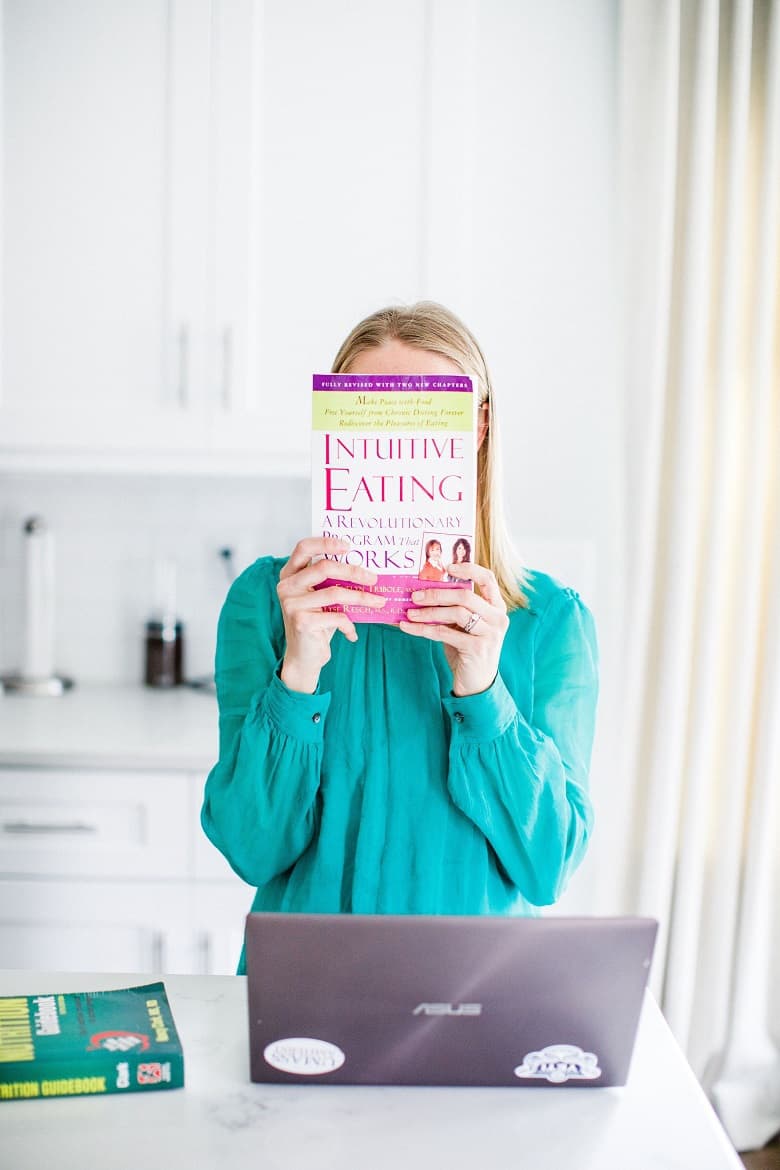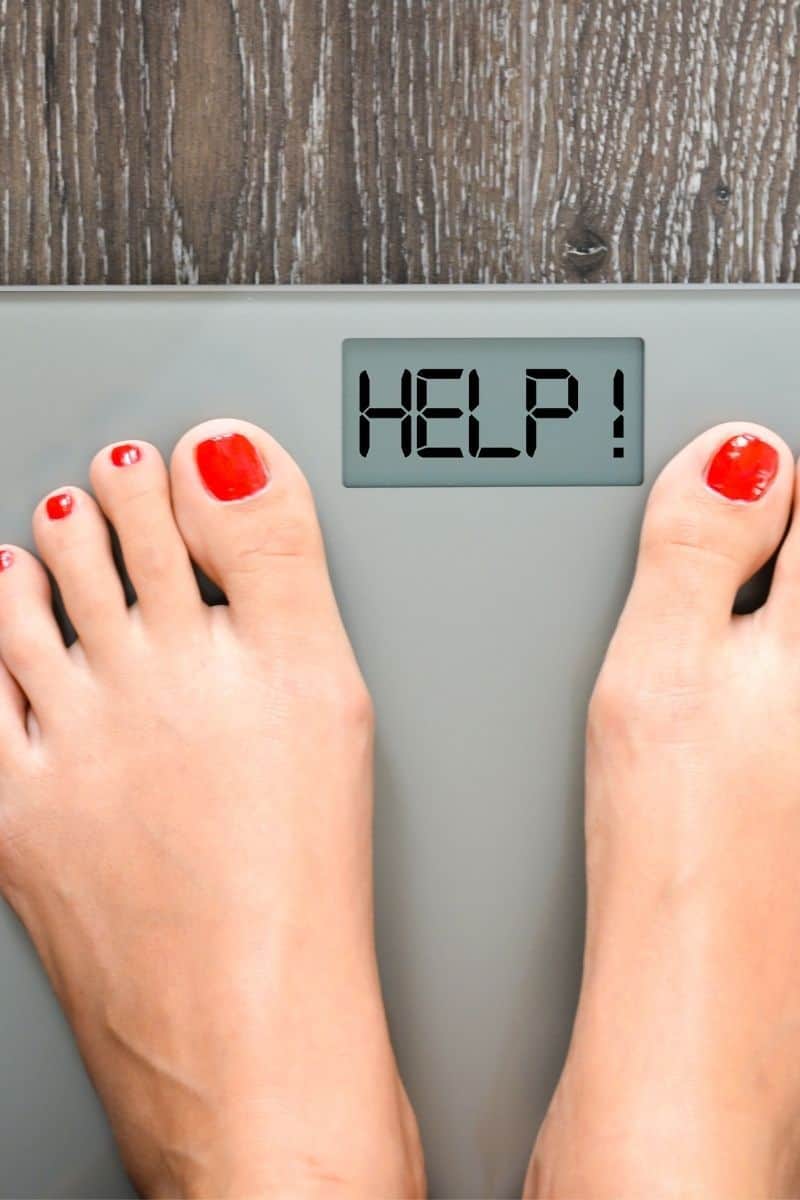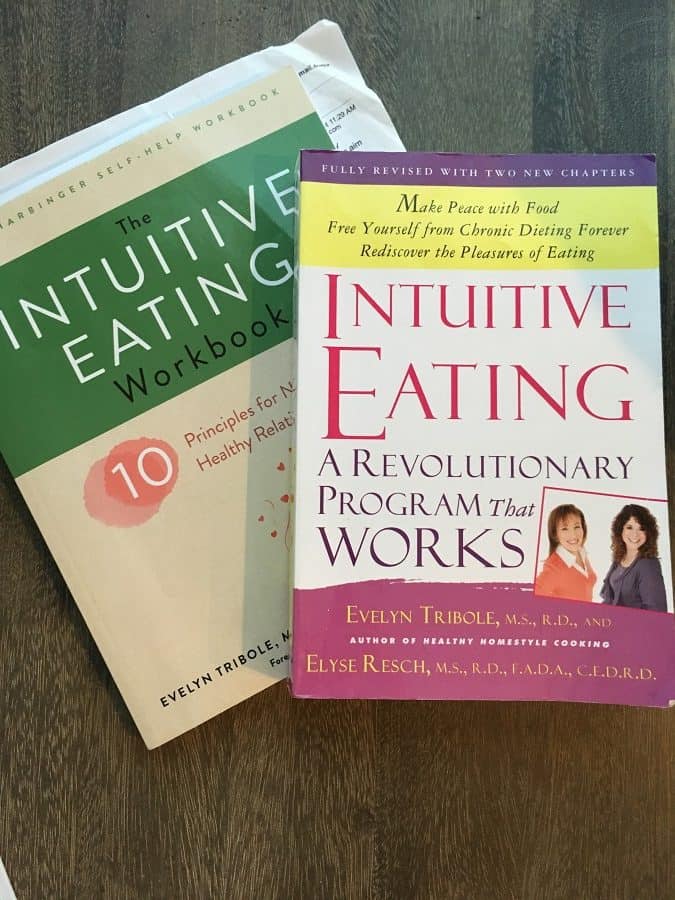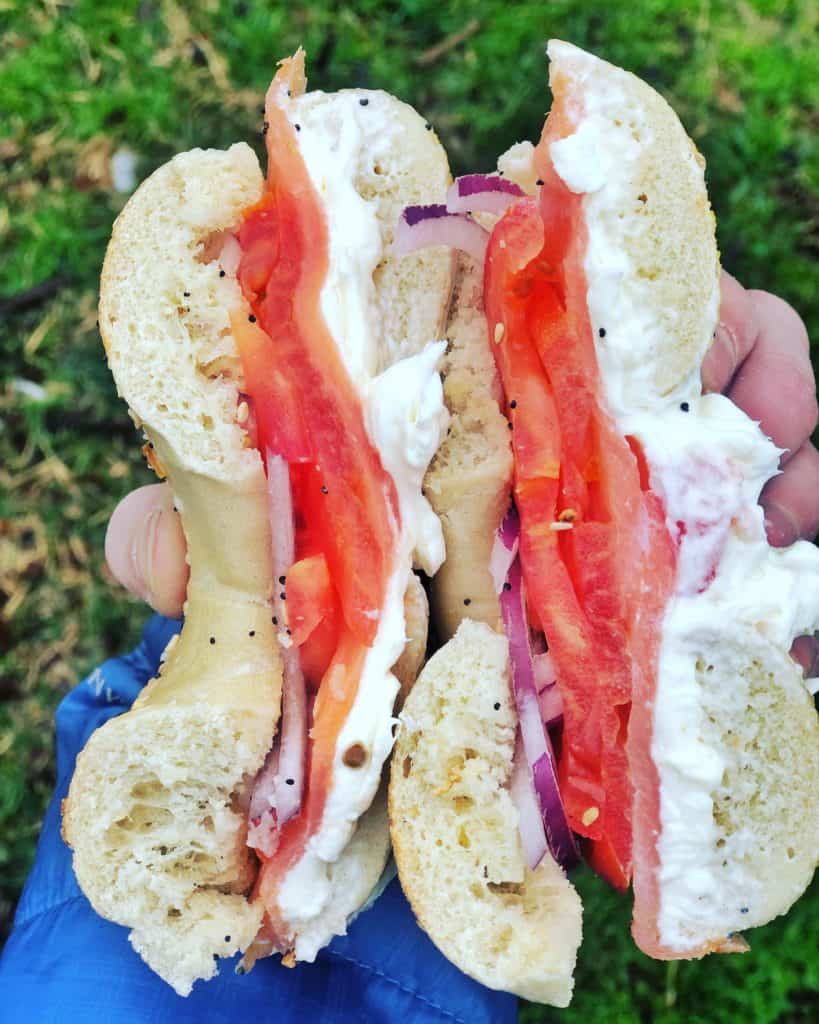If you’ve heard of the non diet approach and want to learn more, these are some of the best intuitive eating books to share how to improve your relationship with food.

As an Amazon Associate, I may earn from qualifying purchases. You can read more here on our Disclaimer and Privacy Page.
As a non diet Registered Dietitian, many clients who come to me for intuitive eating also want some books to supplement their learning journey.
There are so many intuitive eating books I recommend to help you understand about normal eating and how to replicate it in your life.
I always find that having clients learn through their own reading, practicing and doing is most powerful.
Which is why I created my own intuitive eating Ebook and workbook.
STRUGGLING WITH YOUR HUNGER AND FULLNESS?
Grab Our Intuitive Eating Guide to Help You Achieve Food Freedom!
However, how can you learn through doing when you don’t exactly “know” or understand how to eat intuitively or practice gentle nutrition?
Therefore, these books for intuitive eating can help lay the groundwork and education for you.
While I think all of these are the best books for intuitive eating, they are listed in no particular order.
While this is my current list of the best intuitive eating books, there are always more coming out.
I always recommend starting with the original intuitive eating book (listed first), and then, depending on where you are in your journey and what type of reader you are, you can explore from there.
This intuitive eating book review shares some of the key points about each book, so if you’re on a journey for intuitive eating, you feel supported.
Now that intuitive eating is gaining traction and becoming more well-known, it’s fun to see more anti diet culture books, opinions and experiences.
We need more voices and books about intuitive eating in order to to be louder than the diet culture and weight loss industry.

What is Intuitive Eating?
Intuitive Eating is about cultivating trust internally, rather than relying on external rules and guidance for eating.
Intuitive eating is based on the idea that we are all born with the ability to eat intuitively and diet culture has taken that away from us.
Most kids are intuitive eaters because they haven’t yet come to understand diet culture. But it happens quickly!
Intuitive eating for toddlers is always a good place to come back to.
Because of the culture we’ve lived in, our relationship with food has become tarnished, and we’ve learned to ignore hunger and fullness cues.

You may have heard about some of the intuitive eating principles.
- Reject the diet mentality. Diets are all about restriction and deprivation, which can lead to unhealthy eating habits and weight gain in the long run. Instead of following a diet, focus on learning to listen to your body and eat what you enjoy.
- Honor your hunger. Don’t wait until you’re starving to eat. Instead, eat when you’re hungry and stop when you’re full. The intuitive eating hunger scale can help with this.
- Feel your fullness- Just as we want to tune in to hunger, we want to be aware of our body’s fullness signals and learn to feel fullness. It’s okay to overshoot it at times and overeat, but if it happens chronically, we learn that it doesn’t feel good and may need to establish more regular eating patterns.
- Make peace with food. All foods are okay to eat, even the ones that are considered “bad.” There is no need to restrict or avoid any foods.
- Challenge the food police. The food police are the voices in your head that tell you that you’re not allowed to eat certain foods or that you need to eat less. Challenge these voices and remind yourself that you have the right to eat whatever you want.
- Respect your body. Your body is a beautiful and amazing thing. Don’t use food to punish or control it. Instead, focus on nourishing your body with healthy foods and activities.
- Move your body in ways that feel good. Exercise doesn’t have to be a punishment. Find activities that you enjoy and that make you feel good.
- Honor your feelings without using food. Food is not a coping mechanism for stress, anxiety, or boredom. Instead, find healthy ways to deal with your emotions.
- Connect with your body. Pay attention to your body’s signals and learn to listen to what it needs. This includes paying attention to your hunger and fullness cues, as well as your physical and emotional needs.
- Be patient. It takes time to learn to eat intuitively. Don’t get discouraged if you slip up. Just keep practicing and you’ll eventually get there.
We also have blog posts on many of the questions about intuitive eating!
Best Intuitive Eating Books
In my opinion, as a Registered Dietitian who teaches these principles to clients, these are the best books for intuitive eating.
You can use this list as a beginner reference and add to it as needed.

Intuitive Eating
This is the original book written by the actual authors of Intuitive Eating. You should definitely start here!
Anti Diet
Anti-Diet, by Christy Harrison, is another great read. It’s full of scientific evidence and pertinent research on dieting and why it doesn’t work.
It provides a compassionate voice as to why you may feel the way you do, having come on and off several diets.
If you’re a science geek or you have listened to her popular podcast, you’ll want to grab this one.
How to Raise an Intuitive Eater
I’m so excited for this one by two dietitians, Sumner Brooks and Amee Severson.
It starts with talking about the importance of changing and fixing YOUR relationship with food as the groundwork for teaching kids to have a good relationship.
Which is 100% true!fe
It also talks about how kids are born intuitive eaters, but the diet culture around us (and how we act around food) can influence them.
All the more reason to improve your relationship with food.
Just Eat It
In this book, Laura provides a humorous and relatable guide to intuitive eating that helps readers to ditch the diet mentality with the goal to start eating for pleasure and nourishment
“Laura is the clear voice of reason in the world of nutrition and health, as she cuts through a lot of the confusion with hard facts and relatable, funny context,”
Poorna Bell, Journalist for the Guardian, Red, The Pool and former Executive Editor of HuffpostUK
My Body is Not an Apology
This book from Sonya Renee Taylor really helps understand body oppression and shame.
Sharing the information helps educate you to make more practical decisions about body love.
Body Kindness
This book, which acts like a workbook in many cases, helps readers to challenge their negative thoughts and beliefs about their bodies.
The goal is to start to develop and cultivate a more positive and accepting relationship with their bodies, not strive for perfection.
Body image and intuitive eating often go hand in hand.
Gentle Nutrition
This book offers a non-diet approach to healthy eating that focuses on nourishing your body and mind with foods that you enjoy.
Love the beautiful recipes in here, too!
Intuitive Eating for Every Day
I love the daily practices and inspiration that this one offers. A fun way to be proactive and hands on with what you are learning.
F*ck It Diet
Caroline Dooner is a hoot and tells it how it is. She describes herself as an “ex-diet junkie,” which shows through in how she talks about diets and diet culture.
This guide will make you upset for all the time and energy you’ve wasted on dieting, and make you excited to try a new way to approach food and health.
Unapologetic Eating
Alissa has a wonderful voice in the non diet, intuitive eating space. She works with clients and helps teach other dietitians.
Her book, Unapologetic Eating, caters to women, acknowledging that dieting and a fixation on weight, health and appearance, is holding us back from our best life.

Final Thoughts
Intuitive eating really is a journey, not a destination.
It will take time and practice, and probably be a whirlwind of emotions, as you learn to regain your intuitive nature and re-learn how to eat intuitively.
However, to reduce the mental stress and anguish around food, cultivating a positive relationship with food and body, and setting the stage for future generations, it is life-changing.

